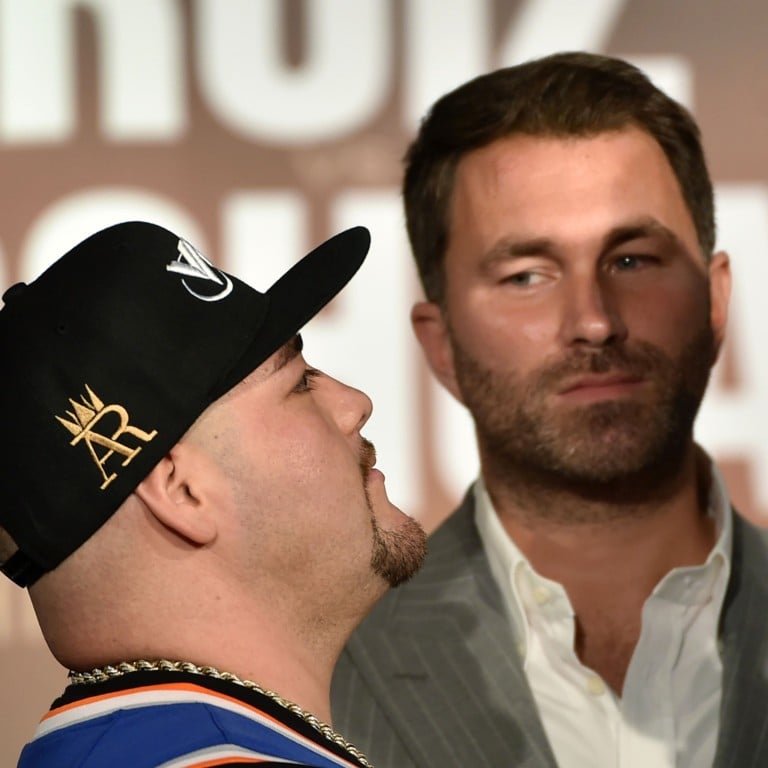
Anthony Joshua vs Andy Ruiz Saudi Arabia fight latest – but not the last – sports-washing success
- ‘Clash on the Dunes’ follows WWE and Brazil vs Argentina this year with more to come in 2020
- Criticism of kingdom’s human rights record has not prevented sport stars from accepting millions on offer
They say that money talks but it does much more than that. It speaks so loudly as to silence those without it and forces others to bury their heads in the sand. That’s the case in Saudi Arabia where Anthony Joshua and Andy Ruiz Jnr are fighting on Saturday night in the so-called “Clash on the Dunes”.
While the fighters are set to net millions of dollars, millions of Saudi citizens are being oppressed by Crown Prince Mohammed bin Salman’s punitive regime. It seems much longer than a year ago when journalist Jamal Khashoggi was summoned to the Saudi consulate in Istanbul and killed for the crime of being outspoken against the rulers of his homeland.
It seems longer ago because so much has happened in the meantime. The Joshua-Ruiz rematch is but one event on a sporting schedule that has quickly become the envy of the world and is only getting bigger.
Brazil and Argentina played a football friendly in the last international break, while next year will see the Saudi Tour cycling event run by the Tour de France organisers and a US$20 million Saudi Cup horse race join the Italian Super Cup and European Tour golf on the calendar.
The widely accepted term is sports-washing, one that stems from the Sport for Rights campaign of 2015 that attempted to put the spotlight on Azerbaijan’s “attempts to distract from its human rights record with prestigious sponsorship and hosting of events”.
The concept is much older, of course, as the 1936 Olympics in Nazi Germany and the 1934 Fifa World Cup in Fascist Italy prove. Go back further and this is not much different from the bread and circuses of the Roman Empire.
The washing in this case is to clean their reputation as if laundering money. However, listening to those involved it could be the same meaning as in brainwashing. It seems to be working.
Joshua and his promoter, Eddie Hearn, have spoken in glowing terms of their experience. They have clearly been treated like kings in the kingdom.
“I look around and everyone seems pretty happy and chilled. I’ve not seen anyone in a negative light out here, everyone seems to be having a good time,” Joshua told the BBC.
“I’m just seeing it from my eyes alone, but for sure the country in itself is trying to do a good job politically.”
Hearn is all about the money. That’s his job and he points out that he would be out of it if he did not deliver. “No journalist or media outlet can possibly tell a fighter where they can’t go to earn money in a sport like this, to be honest with you,” he told the BBC.
They can’t. But they can, like Amnesty International asked of Joshua, hope for them to research the regime and look where their payday is coming from. It’s a similar situation to that of the NBA and its recent China crisis, where individual players should not feel obliged to speak out but would be well served by reading up.
What time is the Andy Ruiz vs Anthony Joshua fight starting and who will win?
You could argue that these events have the effect of drawing attention to goings-on in the country and bringing it into the conversation, that we are only discussing the regime and its human rights record because of the fight.
Boxing has been here before. The “Thrilla In Manila” fight between Muhammad Ali and Joe Frazier in 1975 took place amid the Marcos regime ruling the Philippines, while Ali’s “Rumble In The Jungle” with George Foreman the year before was held in the Mobutu Sese Seko-ruled Zaire with money from Libyan dictator Muammar Gaddafi.
Forty-odd years on and nothing much has changed, but boxing is not the only sport and Saudi Arabia is not alone in trying to rebrand itself through sport. It is the most high profile and star studded though.
It is also the only country set to build a new city to open the country up even more. As part of the crown prince’s Vision 2030 campaign, a mega-city called Neom will reportedly operate outside of the strict sharia law governing the rest of the kingdom. More sport is set to follow.
The WWE was here last month, though its stars were reportedly “held hostage” on the runway in a row over US$500 million owed for its two Saudi shows last year. A few disgruntled wrestlers vowed not to go back, but that is about as far as the backlash has got.
While Rory McIlroy and Tiger Woods have turned down millions to play in February’s Saudi International, plenty of other golfers have signed on. That’s their choice but it should be on the governing bodies, broadcasters and organisations to make a stand, but few have.
The Spanish Super Cup, now expanded to a four-team tournament, is in Saudi Arabia next month. Spanish state broadcaster RTVE is not going to televise it because of concerns over the Gulf state. Other broadcasters took the same stance. Not Movistar, though, which will screen the game.
Not only does the money always talk but it has the last word.

